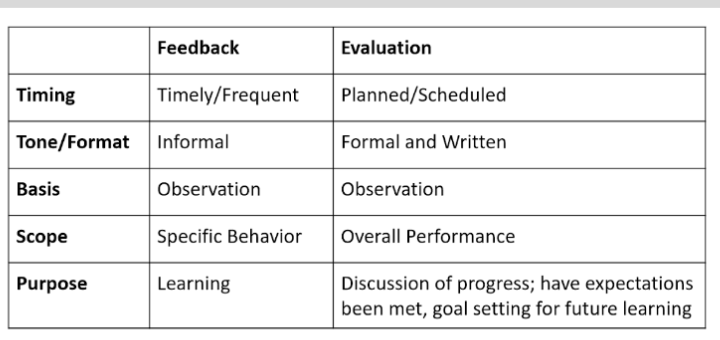414 Lec 12-13
5.0(1)
Card Sorting
1/24
Earn XP
Description and Tags
Last updated 1:30 AM on 2/26/23
Name | Mastery | Learn | Test | Matching | Spaced | Call with Kai |
|---|
No analytics yet
Send a link to your students to track their progress
25 Terms
1
New cards
List and define each aspect of the SCORE method for performance Management.
S: Strategy
C: Communication
O: Opportunity
R: Recognition
E: Engagement
C: Communication
O: Opportunity
R: Recognition
E: Engagement
2
New cards
S: Strategy
•Describe what employees are supposed to do and why
•Create defined measures of performance that are linked to outcomes
•Create defined measures of performance that are linked to outcomes
3
New cards
C: Communication
•Both more informal feedback and formal evaluation
4
New cards
O: Opportunity
•Link people with jobs at which they excel
•Look for ways to improve people-job links
•Connect with other employees, other departments
•Professional growth opportunities
•Look for ways to improve people-job links
•Connect with other employees, other departments
•Professional growth opportunities
5
New cards
R: Recognition
•Recognize specific employee behaciors
→compliment positive things
→specofoc feedback
→weaknesses important as well
→compliment positive things
→specofoc feedback
→weaknesses important as well
6
New cards
E: Engagement
→Solicit employee input on how to better achience objectives in the organization
→Provide employees with resources to perform their work
→Provide employees with resources to perform their work
7
New cards
Describe the difference between feedback and evaluation.

8
New cards
six types of evaluation bias.
•Leniency bias
•Contrast bias
•Similarity bias
•Recency bias
•Experience bias
•Likeability bias
•Contrast bias
•Similarity bias
•Recency bias
•Experience bias
•Likeability bias
9
New cards
Leniency bias
manager is either too strict or too lenient
10
New cards
Contrast bias
staff are compared to each other, rather than the standard
11
New cards
Similarity bias
manager favors people who are like them
12
New cards
Recency bias
looking only at the most recent behaviour/accomplishment
13
New cards
Experience bias
our perspective is accurate and the only way to see it
14
New cards
Likeability bias
the more likable, the more successful
15
New cards
Discuss how bias can be minimized in evaluation and feedback Processes
•Build awareness that vias exists in order to minimze its effect
\
•Gather people’s perspectives - 360 evaluations (peer review)
•Do not use self evaluation
•Establish clear and measurable goals
•Give real time feedback
\
•Gather people’s perspectives - 360 evaluations (peer review)
•Do not use self evaluation
•Establish clear and measurable goals
•Give real time feedback
16
New cards
trait-based performance evaluation
assess employee display of job traits
17
New cards
behavior-based performance evaluation
assess employee display of job behaviors
18
New cards
results-oriented performance evaluation
assess employee progress towards defined objectives
19
New cards
Define personal brand
The **conscious** and **intentional** effort od individuals to create and influence public perception by position themselves as authorities in their industries, elevating their credibility, and differentiating themselves from the competition, to ultimately **advance their careers**, increase their circles of **influence** and have a larger impact
20
New cards
List the elements of a personal brand
Cluster of ideas and expectations that come to people’s minds when they think of you:
•What you stand for
•Your beliefs, values, knowledge and passion
•Makes you unique and memorable
•Makes you a valued asset to the organization
•Defines how people view and relate to you
•Frames people’s perceptions of your role & effectiveness
•What you stand for
•Your beliefs, values, knowledge and passion
•Makes you unique and memorable
•Makes you a valued asset to the organization
•Defines how people view and relate to you
•Frames people’s perceptions of your role & effectiveness
21
New cards
Explain how a strong personal brand can increase professional competitiveness.
If you are trusted, decision makers may be more receptive to your ideas
22
New cards
Describe the concept of brand clarity
How close your internal brand (how you think about yourself) and you external brand (how others think of you) align
23
New cards
Identify what makes a personal brand credible.
Competence
Trustworthiness
Passion
Tenacity
Objectivity
Trustworthiness
Passion
Tenacity
Objectivity
24
New cards
Cite strategies for transforming one’s personal brand.
•Value of resources you offer to an organization
→identify resources most valued by the org and develop them
\
•Scarcity of resources
→highly valued and scare resources
→identify resources most valued by the org and develop them
\
•Scarcity of resources
→highly valued and scare resources
25
New cards
List strategies you can use to influence others
1. Establishing credibility
2. Framing goals to identify a common ground
3. Reinforce one’s position with compelling and vivid evidence
4. Connect emotionally with audience